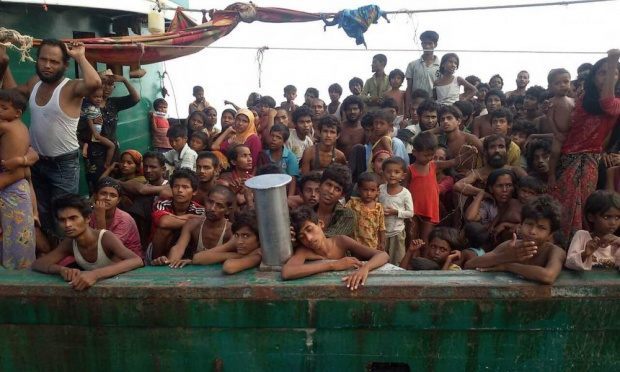Malaysia, Thailand and Indonesia have turned away boats laden with thousands of migrants headed for their shores. Officials from the two countries met the boats, handed over fuel and supplies and sent them on their way.
As Europe wrangles over the number of migrants each country should accept following it’s own maritime migrant crisis, the Asian states have taken a more straightforward approach, simply barring the boats from docking and closing their borders to the refugees. This follows the example set by Australia’s tough policy of sending any and all illegal migrant boats on their way back to their port of departure – by force if necessary.
The migrants are mainly Rohingya Muslims, fleeing persecution by the Burmese state. Over the last three years, 120,000 Rohingya from a population of 1.2 million have fled, often paying huge sums to human traffickers to board ships heading out across the Bay of Bengal. More recently they have been joined by Bangladeshis hoping to escape poverty.
But thanks to a crackdown by various security services, the traffickers abandoned the boats, leaving around 6,000 migrants to fend for themselves on the open seas, the Guardian has reported.
“This is a grave humanitarian crisis demanding an immediate response,” said Matthew Smith, executive director of human rights group Fortify Rights. “Lives are on the line.”
His voice has been joined by that of the UN and various other aid agencies, all of which are urging the governments of Malaysia, Thailand and Indonesia to take in the migrants. But the Asian nations have fought back, pointing out that they have already had to cope with large numbers of Rohingya migrants and are struggling to cope.
“What do you expect us to do?” Malaysian deputy home minister Wan Junaidi Jafaar said. “We have been very nice to the people who broke into our border. We have treated them humanely but they cannot be flooding our shores like this. We have to send the right message that they are not welcome here.”
His statement came just days after 1,000 refugees disembarked on the shores of Langkawi, a luxury resort island in northern Malaysia. Another 600 were smuggled into Indonesia.
Thai prime minister Prayuth Chan-ocha was is in agreement, reiterating that the countries simply do not have the resources to deal with the migrants.
“If we take them all in, then anyone who wants to come will come freely. I am asking if Thailand will be able to take care of them all. Where will the budget come from?” Prayuth said. “No one wants them. Everyone wants a transit country like us to take responsibility. Is it fair?”
Instead, the countries have dealt with the migrants still at sea by equipping them with fuel and provisions. Wan Junaidi said that one boat with 500 people on board had been intercepted off the coast of northern Penang state on Wednesday and had been given supplies before being sent on its way. Another carrying 300 people was turned away from the coast near Langwaki overnight after being handed supplies, Malaysian officials said.
Captain Chayut Navespootikorn, a senior naval official, said “To bring them into our country is not our policy. If they need fuel or food to go on [to a third country] we would help them with it.”
The policy has led Phil Robertson of Human Rights Watch Asia to accuse Indonesia, Thailand and Malaysia of playing “a three-way game of human ping pong”. He also criticised the countries’ unwillingness to discuss the persecution of the Rohungya people with Burma.
But that appears to be changing. Wan Junaidi said that it was now time to put pressure on Burma to address the crisis. “You talk about democracy, but don’t treat your citizens like trash, like criminals until they need to run away to our country,” he said.
The British government may look to the situation in Asia as a template for how to handle Europe’s own boat migrant crisis across the Mediterranean, as thousands flock from across Africa and the Middle East to find refuge within the EU member states.
European officials want the EU member countries to accept a quota of migrants numbering in the thousands each, but Home Secretary Theresa May has hit back, saying the migrants should be sent home.
Writing in the Times yesterday, Ms May said “We must – and will – resist calls for the mandatory relocation or resettlement of migrants across Europe.
“Such an approach would only strengthen the incentives for criminal gangs to keep plying their evil trade – and reduce the incentive of member states to develop their own effective asylum regimes.”
Speaking to Sky News she added “It’s important that the criminals aren’t able simply to say to people: ‘If you pay us money, we are going to put your lives at risk but don’t worry, you’ll get to Europe’.
“And that’s why it’s important that people picked up in the Mediterranean can be taken back to Africa.”

COMMENTS
Please let us know if you're having issues with commenting.